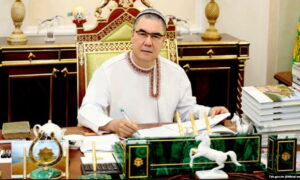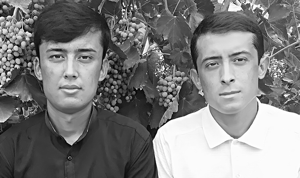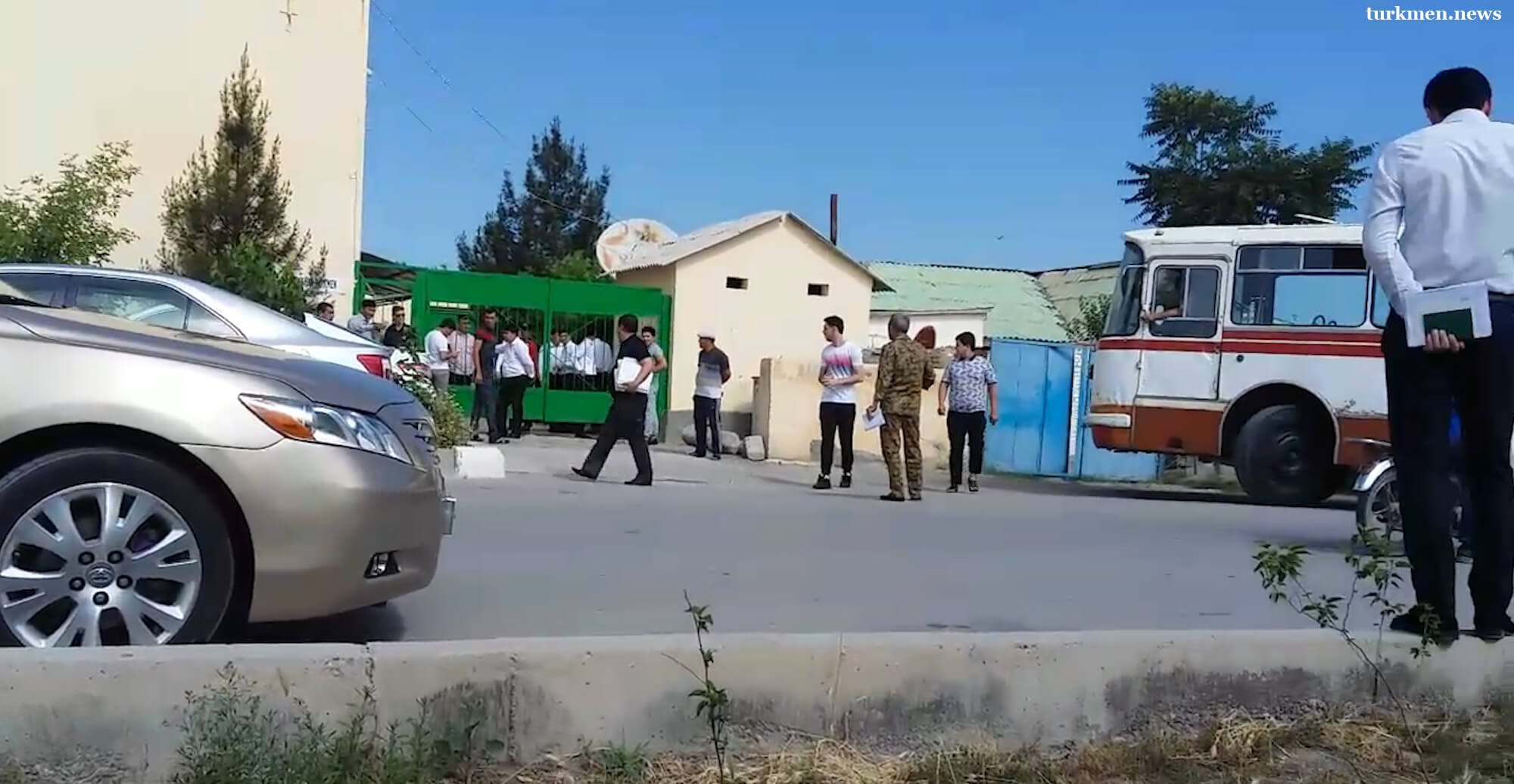Six conscientious objectors to compulsory military service sentenced to corrective labour since October 2014, including Dayanch Jumayev in February. They live at home under restrictions, the state seizing a fifth of their wages. Appeals from 11 conscientious objectors are with UN Human Rights Committee.
Young men continue to be convicted on criminal charges in Turkmenistan for refusing compulsory military service on grounds of religious conscience and sentenced to corrective labour. Six young Jehovah’s Witnesses have been convicted and given such corrective labour sentences since October 2014, Jehovah’s Witnesses told Forum 18, with the most recent known sentence in February 2016. The men must live at home under restrictions and a fifth of their wages are seized by the state.
No conscientious objectors to military service are known currently to be imprisoned. Jehovah’s Witness prisoner of conscience Bahram Hemdemov is serving a four-year sentence on charges of inciting religious hatred, charges he denies (see below).
Over many years, Jehovah’s Witness young men have routinely been convicted for refusing compulsory military service on grounds of religious conscience. Although in earlier years some were given non-custodial sentences, most were imprisoned. The last known imprisoned conscientious objector, Ruslan Narkuliyev, was freed under amnesty in February 2015 (see F18News 18 February 2015 http://www.forum18.org/archive.php?article_id=2039).
The United Nations (UN) Human Rights Committee is due to begin its review of Turkmenistan’s record under the International Covenant on Civil and Political Rights at a closed meeting in Geneva on the afternoon of today (5 July). Turkmenistan failed to meet a call during the last review of the country in 2012 for it to introduce a civilian alternative to compulsory military service. It also failed to explain to the Committee why it had not introduced such an alternative service (see below).
Appeals from 11 young men convicted for refusing compulsory military service (nine of them former prisoners of conscience) are under review by the Committee (see below).
No alternative service
Turkmenistan offers no alternative to its compulsory military service. Article 41 of the Constitution describes defence as a “sacred duty” of everyone and states that military service is compulsory for men. Military service for men between the ages of 18 and 27 is generally two years. A proposed Alternative Service Law was reportedly drafted in 2013, but officials have been unable to tell Forum 18 if and when it might be adopted (see F18News 29 September 2014 http://www.forum18.org/archive.php?article_id=2002).
Criminal Code Article 219, Part 1 punishes refusal to serve in the armed forces in peacetime with a maximum penalty of two years’ imprisonment or two years’ corrective labour.
On 12 April a new Religion Law came into force, which among other restrictions repeats the existing ban on conscientious objection to military service (see F18News 5 April 2016 http://www.forum18.org/archive.php?article_id=2164).
Six corrective labour sentences
All six of the young men convicted and given corrective labour punishments since October 2014 were punished under Criminal Code Article 219, Part 1. Sentences were generally of one or two years. All had 20 per cent of their wages ordered seized by the state, Jehovah’s Witnesses told Forum 18. Those convicted chose not to appeal against their sentences for fear they might be changed to custodial sentences.
Among those convicted were: Akmurad Nurjanov in December 2014; Timur Baltayev in January 2015; Serdar Hemdemov in April 2015; Kerven Kakabayev in December 2015; and Dayanch Jumayev in February 2016.
Jumayev, who is from the capital Ashgabad [Ashgabat], was in February 2016 sentenced to one year of corrective labour.
The 20-year-old Hemdemov, who is from the eastern city of Turkmenabad [Turkmenabat] (formerly Charjew), was in April 2015 sentenced to two years’ corrective labour. In March 2015 he was given two consecutive 15-day prison terms after police raided a meeting for worship in the family home in Turkmenabad. In April 2015, during his second 15-day term of imprisonment, he was placed in isolation and severely tortured (see F18News 21 May 2015 http://www.forum18.org/archive.php?article_id=2063).
Serdar Hemdemov’s father Bahram Hemdemov is a prisoner of conscience. Police arrested Bahram Hemdemov during the March 2015 raid on his home, following which they tortured him. He is serving a four year prison term on charges of inciting religious hatred. All Hemdemov’s attempts to overturn his sentence on appeal have failed (see F18News 5 April 2016http://www.forum18.org/archive.php?article_id=2164).
No alternative service law
No move to adopt an Alternative Service Law appears imminent, despite the apparent drafting of such a Law in 2013 (see F18News 29 September 2014 http://www.forum18.org/archive.php?article_id=2002).
Pirnazar Hudainazarov, Chair of the Mejlis (Parliament) Legislative Committee, refused absolutely to discuss with Forum 18 on 29 June if and when such a law might be adopted. “Talk to the Foreign Ministry,” he kept repeating. When Forum 18 pointed out that the Mejlis adopts laws, not the Foreign Ministry he put the phone down.
Recent legal changes have increased the penalties for exercising freedom of religion and belief. On 12 April a new Religion Law came into force. Among other restrictions it keeps the existing ban on exercising freedom of religion and belief with others without state permission, and increases the number of founders who can apply for legal status for a religious community from five to 50. The new government Commission that controls religion needs to approve all religious literature and any new places of worship. The Religion Law also repeats the existing ban on conscientious objection to military service (see F18News 5 April 2016 http://www.forum18.org/archive.php?article_id=2164).
Eleven appeals with UN Human Rights Committee
Eleven appeals from Jehovah’s Witness young men who were convicted for refusing compulsory religious service on grounds of religious conscience (nine of whom are former prisoners of conscience) are awaiting decisions by the UN Human Rights Committee. The Committee is considering such appeals at its current session which runs from 20 June to 15 July. It is not yet known whether it will be issuing decisions in any of these 11 cases during the session.
The 11 are among 15 Jehovah’s Witness young men who lodged appeals between September 2012 and August 2013 over punishments for refusing military service on religious grounds.
The nine former prisoners of conscience awaiting Human Rights Committee decisions are: Novruz Nasyrlayev, Matkarim Aminov, Dovran Matyakubov, Shadurdy Uchetov, Akmurat Egendurdiev, Arslan Dovletov, Juma Nazarov, Yadgarbek Sharipov and Atamurat Suvkhanov. Similarly awaiting decisions are Akmurad Nurjanov, who served a suspended prison term, and Danatar Durdyyev, who was fined.
In his complaint to the UN, Uchetov notes that he repeatedly told the Conscription Office and the courts why he could not in conscience conduct military service. “I told the court that, given my respect for my country and my duty to the state, I was willing to perform alternative civilian service,” he declared in his 23 June 2012 statement attached to the complaint (see F18News 18 February 2013 http://www.forum18.org/archive.php?article_id=1802).
In March and October 2015 the UN Human Rights Committee found that Turkmenistan had violated the rights of four further Jehovah’s Witness young men by imprisoning them for refusing compulsory religious service on grounds of religious conscience. The Committee also ruled that beatings and other maltreatment (such as a head being repeatedly bashed against a wall) of Zafar Abdullayev, Mahmud Hudaybergenov, Ahmet Hudaybergenov and Sunnet Japparov is torture and the government needs to provide reparations (see F18News 5 April 2016 http://www.forum18.org/archive.php?article_id=2164).
Torture has been routinely used against prisoners of conscience jailed for exercising freedom of religion and belief, including conscientious objectors to military service. Torture, rape threats and fines were also used against the families and friends of such prisoners of conscience after they complained to the UN Human Rights Committee (see F18News 5 April 2016 http://www.forum18.org/archive.php?article_id=2164).
Under the UN Convention against Torture and Other Cruel, Inhuman or Degrading Treatment or Punishment, Turkmenistan is obliged to arrest and try under criminal law any person suspected on good grounds of having committed torture (see Forum 18’s Turkmenistan religious freedom survey http://www.forum18.org/Archive.php?article_id=1676).
No one at the Foreign Ministry in Ashgabad was available on 4 July to discuss with Forum 18 what measures – if any – have been put in place to compensate the four young men for the violation of their rights or to prevent others similarly having their rights violated.
On 5 April Forum 18 wrote to Ambassador Atageldi Haljanov at Turkmenistan’s Mission to the United Nations in Geneva to ask what steps the government has taken to recompense these four young men for the violations of their rights and what steps it has taken to prevent the violations (imposition of compulsory military service, torture) happening again. Despite resending the questions on 24 June, Forum 18 had received no response by the morning of the working day in Switzerland on 5 July.
UN Human Rights Committee ignored
Following its review of Turkmenistan in March 2012, the UN Human Rights Committee reminded it that guaranteeing the human rights of those with conscientious objections to serving in the armed forces requires the provision of a genuine civilian alternative. It also called among other things for an end to restrictions on exercising freedom of religion and belief without state permission, religious education and the import of religious literature That same month, Zafar Abdullaev, a 24-year-old Jehovah’s Witness conscientious objector, was given the maximum two year prison sentence for refusing to do military service (see F18News 18 April 2012 http://www.forum18.org/archive.php?article_id=1691).
“The State party should take all necessary measures to review its legislation with a view to providing for alternative military service,” the Committee noted in its Concluding Observations (CCPR/C/TKM/CO/1). “The State party should also ensure that the law clearly stipulates that individuals have the right to conscientious objection to military service. Furthermore, the State party should halt all prosecutions of individuals who refuse to perform military service on grounds of conscience and release those individuals who are currently serving prison sentences” (see F18News 18 April 2012 http://www.forum18.org/archive.php?article_id=1691)
In its 27 July 2015 response to this point of the Concluding Observations (CCPR/C/TKM/2), Turkmenistan failed to respond to these demands and simply restated the current legal obligation for all young men to perform military service unless exempted on grounds of health of family circumstances.
The response noted that “in accordance with Presidential Decision No. 2482 of 2 February 1996, which established technical medical units in the country’s armed forces, citizens who invoke their religious beliefs to refuse to perform military service may serve in medical institutions as junior staff or service personnel”. However, as such service is under Defence Ministry control it does not meet international human rights commitments for a genuine alternative service outside military structures.
The Human Rights Committee is scheduled to begin its review of Turkmenistan’s record on 5 July in Geneva. The full review is expected to take place in spring 2017. (END)





